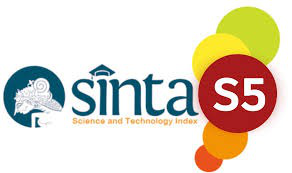Strengthening School Counseling Guidance Activities through e-counseling
Abstract
Cybercounseling is defined as a professional counseling practice that occurs when the counselee and counselor are separately and utilize electronic media to communicate via the internet. Several problems arise in student coaching activities by Guidance Counseling teachers, namely: not yet optimal use of cyber counseling applications, recording of student progress, which is still done manually, and the unavailability of facilities for students to express academic and non-academic problems. The technology provided is an e-counseling application. The method used in this activity is an e-counseling implementation workshop. Computer Vocational Schools as partners have been involved in the stages of needs identification, implementation, and trials. The school elements involved are Principals, Students, BK teachers, and homeroom teachers. This technology provides an alternative repository of student development. Based on the results of the workshop, it was found that the repository was available at 85% and the usability level of the system was 75%.
Keywords
Full Text:
PDFReferences
Arista, D. A. dkk. (2017). Aplikasi Cyco (Cybercounseling) Sebagai Salah Satu Alternatif Model Konseling di Sekolah. Seminar Nasional BK FIP-UPGRIS. 230–238
Farozin, M., Kurniawan, L., & Irani, L. C. (2020). The Role of Guidance and Counseling in Character Education. Proceedings of the 2nd International Seminar on Guidance and Counseling 2019 (ISGC 2019), 462, 112–116. https://doi.org/10.2991/assehr.k.200814.025
Gumilang, G. S. (2020). Guidance and Counseling Service During Covid-19 Pandemic (Analytical Study of Lakon Marifat Dewa Ruci). International Reseacrh Journal of Multidiciplinary Studies, 6(8), 1–11.
Hariko, R. (2017). Landasan Filosofis Keterampilan Komunikasi Konseling. Jurnal Kajian Bimbingan Dan Konseling,2(2),41–49.
Ifdil, I., & Ardi, Z. (2013). Konseling Online Sebagai Salah Satu Bentuk Pelayanan E-konseling. Jurnal Konseling Dan Pendidikan.1,15–21
Hastuti, M. M. S & Tyas, P. H. P. (2021). Online Media Usage in Guidance and Counseling Services during the Covid-19 Pandemic. Jurnal Kajian Bimbingan dan Konseling, 6(2), 60–70. https://doi.org/10.17977/um001v6i22021p060-070
Kraus, R. et al. (2011). A Handbook for Mental Health Professionals. India: Elsevier Inc
Mohd, C. K. N. C. K., & Shahbodin, F. (2015). Personalized learning environment: alpha testing, beta testing & user acceptance test. Procedia-Social and Behavioral Sciences, 195, 837-843.
Shaw, H. E., & Shaw, S. F. (2006). Critical Ethical Issues in Online Counseling: Assessing Current Practices With an Ethical Intent Checklist. Journal of Counseling & Development, 84(1), 41–53. https://doi.org/10.1002/j.1556- 6678.2006.tb00378.
Yusuf, S. (2009). Program Bimbingan dan Konseling Di Sekolah. Bandung: Rizqi Press
Yusuf, S dan Nurihsan, J. (2008). Landasan Bimbingan dan Konseling. Bandung: PT. Remaja Rosdakarya
DOI: https://doi.org/10.46336/ijeer.v2i1.241
Refbacks
- There are currently no refbacks.
Copyright (c) 2022 Prihastuti Harsani, Erniyati Erniyati, Dadang Kurnia
Published By:
IJEER: Jalan Riung Ampuh No. 3, Riung Bandung, Kota Bandung 40295, Jawa Barat, Indonesia
IJEER Indexed By:
 This work is licensed under a Creative Commons Attribution 4.0 International License.
This work is licensed under a Creative Commons Attribution 4.0 International License.









